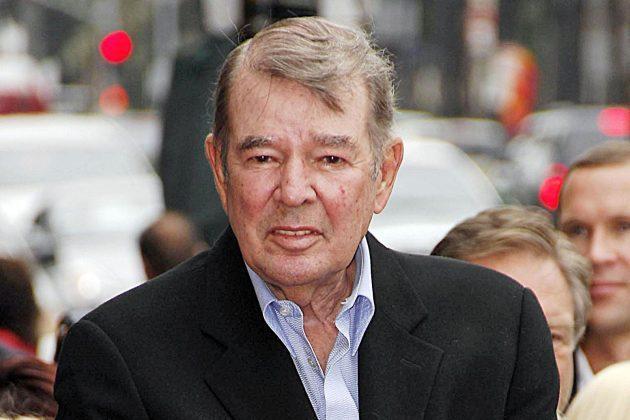
Alan Ladd Jr, the veteran film producer who won a Best Picture Oscar for Braveheart, commissioned George Lucas to write Star Wars and was an influential executive for Fox and MGM/United Artists, died today, his family said. He was 84.
His daughter Amanda Ladd-Jones, who directed the 2017 feature documentary Laddie: The Man Behind the Movies wrote on social media: “With the heaviest of hearts, we announce that on March 2, 2022, Alan Ladd, Jr. died peacefully at home surrounded by his family. Words cannot express how deeply he will be missed. His impact on films and filmmaking will live on in his absence.”
More from Deadline
Watch a trailer for her documentary below.


Everett Collection
Along with Star Wars and Braveheart, Ladd was responsible for such Hollywood classics as a producer and studio boss, including Alien, Blade Runner, The Omen, All That Jazz, Norma Rae, Chariots of Fire, Thelma & Louise and Young Frankenstein.
Overall, his films earned more than 50 Academy Awards — including two Best Picture wins — and more than 150 nominations.
“If you gotta work for a studio boss, he was it,” Brooks said in Laddie.
Ladd was born on October 22, 1937, in Los Angeles and grew up in the industry as the son of Shane and The Great Gatsby star Alan Ladd. He began producing films in the early 1970s after getting his start in the business as a motion picture talent agent at Creative Management Associates. His client list included such heavyweights as Judy Garland, Warren Beatty and Robert Redford. Ladd later relocated to London, where he produced nine features in four years.


Lucasfilm
A man of few words relative to the industry’s chattering norms and with a low-key style, Ladd was in his mid-30s when he returned to Los Angeles in 1973 to serve as Head of Creative Affairs at Twentieth Century Fox. He rose through the ranks quickly and was named studio president in 1976. Soon after joining Fox, he was intrigued by a then-unreleased American Graffiti and sought a meeting with its young director, George Lucas, to see if he has any ideas for another film.
Lucas outlined a character-driven outer-space epic. Despite little precedent for such a movie, Ladd loved the idea and commissioned Lucas to write what would become Star Wars.
“Laddie was one of the few people that actually said, ‘I trust the artist,” Lucas said in the documentary.
Ladd later would greenlight and/or shepherd such smash Fox films as Return of the Jedi, Alien, The Omen, The Towering Inferno, Young Frankenstein, Norma Rae, All That Jazz, The Rocky Horror Picture Show, Silver Streak, The Rose and The Rocky Horror Picture Show.
During his tenure at Twentieth Century Fox, the studio’s profits went to another galaxy, and its stock rocketed by 1,600%. During the mid-’70s, Ladd would name Ashley Boone as Fox’s President of Marketing — making him the first Black person to be president of a studio division. His sister Cheryl Boone-Isaacs later became the first Black president of the Academy of Motion Picture Arts and Sciences.
Ladd made the cover of Esquire magazine in April 1978, with the headline “Triumph of the Laid-Back Style.”
He left Fox in 1979 to returning to producing and formed The Ladd Company. It was a quick success, scoring a Palme d’Or at Cannes for Akiro Kurosawa’s Kagemusha (1980) and a Best Picture Oscar win for Chariots of Fire (1981). The company followed with such popular and acclaimed films as Blade Runner (1982) — starring Star Wars and American Graffiti‘s Harrison Ford — The Right Stuff (1983), Once Upon a Time in America (1984) and the lucrative if loopy Police Academy movies.


Everett Collection.
He hired an child actor-turned-action star-turned aspiring director to helm the 1982 morgue-set comedy Night Shift. Ron Howard would go on to win a pair of Oscars and become one of Hollywood’s biggest players.
“That kind of risk taking is somewhat absent,” Howard said in 2017.
Night Shift featured Howard’s Happy Days co-star alongside a young TV actor named Michael Keaton — launching the latter’s feature career. A pre-Cheers Shelley Long also starred.
Fast-forward to 1985, when Ladd took over MGM/United Artists. Ladd dissolved his production company to become Chairman and CEO of the studio, scoring a quick hit with Rocky IV (1985). He went on to shepherd such MGM/UA classics as Norman Jewison’s Moonstruck (1987), Mel Brooks’ Spaceballs (1987), John Cleese’s A Fish Called Wanda (1988), Howard’s Willow and Thelma and Louise (1980), from Alien helmer Ridley Scott.
Alien star Sigourney Weaver said in the Laddie documentary, “The objective was to help these incredibly creative people make the best possible movie they could.”


Everett Collection
Ladd would quit the executive life in 1993, resurrecting The Ladd Company at Paramount Pictures. There, he rolled the dice on another action star-turned-filmmaker. Mel Gibson had helmed only the 1993 drama The Man Without a Face when he went behind the camera to direct himself in Braveheart. The 1995 tale of fabled Scottish warrior William Wallace went on to win five Oscars including Best Picture and Best Director.
“There’s guys who just do it,” Gibson said in Laddie. “He is one of those guys, and that’s what you want.”
The Ladd Company later made The Brady Bunch films and The Man in the Iron Mask, the latter starring Leonardo DiCaprio in is first post-Titanic role.
The company exited Paramount in 1999, and his first film afterward would be Lasse Hallstrom’s 2005 An Unfinished Life for Miramax, starring Redford, Jennifer Lopez and Morgan Freeman. The Ladd Company followed that up with Gone Baby Gone, the 2007 thriller directed by and starring Ben Affleck.
Along with daughter Amanda, Ladd is survived by his wife, Cindra Pincock; children Kelliann and Tracy Ladd; a half-brother, David Ladd; a half-sister, Alana Ladd; and step-sister Carol Lee Stuart-Ladd.
Here is the full trailer for Laddie: The Man Behind the Movies:
[embedded content]
Best of Deadline
Sign up for Deadline’s Newsletter. For the latest news, follow us on Facebook, Twitter, and Instagram.




